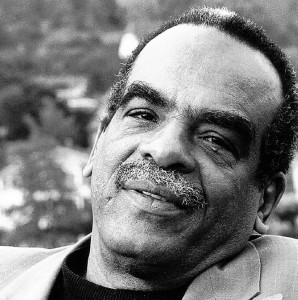
Edouard Glissant (1928 – 2011) was a Martinican poet, novelist and theorist. He is especially known for his “Poetics of Relation”, an exploration of relational belonging as a decolonial poetic intervention. Initially, Glissant’s work was directed against the essentialising tendencies of the négritude movement, which, in turn, was directed against an exclusion of black people from the domain of ‘culture’. Following the backlash against the naturalisation of the ‘negro’, Glissant attempted to reintroduce ‘nature’ as an acceptable topic for Caribbean literature and as a vital part of the decolonial project (see Maryse Condé, 1998).
While Glissant’s work is saturated with references to the ‘natural’, his main interest seems in destabilising the nature-culture boundary. In his 1958 book ‘La Lézarde’, for instance, entities and phenomena normally relegated to ‘nature’ permeate every human action that is described. Through this constant permeation of the ‘cultural’ with the ‘natural’, the meaning of these ‘natural’ events and entities remain deeply unstable. In his later work, Glissant extends his attention to relations between the local and the global, especially the effects of globalisation. Against this ‘mondialisation’ (globalisation), he proposes a mondialité (variously translated as worldmentality, worldliness or worlding). Glissant’s translator Michael Dash describes the author’s aim as a dismantling of the individual and the ‘heroics of self-formulation’ (Dash, 1989: 609), through situating the mind in the body, and the body in relation to the world.
Like Aimé Césaire, Glissant insists on poetics as a means of building new imaginaries, because of a disillusionment with political processes as a means of change. Poetics, he argues, may be, on the one hand, totally ineffective against oppression, but that also makes them powerful – they are at once outside of the system and within reach of those outside it. As part of his poetic intervention, Glissant has developed a rich repertoire of neologisms, partly influenced by Deleuze and Guattari, but also chaos theory. These describe aspects of Glissant’s relational vision of the world that is set against totalitarian structures of thought:
“Glissant’s name for the relations between all things is the world, which appears threefold: as tout-monde (the world in its entirety), écho-monde (the world of things resonating with one another) and chaos-monde (a world that cannot be systematized)” (Loock, 2012).
Together, they represent a different kind of totality – a totality as openness and a temporary product of process: ‘what is totality, once again, and through return, if not the relation of each matter to all others? (Glissant, 2009: 16).
Because of its perceived abstraction, Glissant’s later work has often been criticised as ‘apolitical’, for its extreme destabilisation (leading to what?) and its reliance on chaos theory’s dictum that small events in remote places can have big consequences somewhere else. This can be read both as an affirmation of the non-futility of small actions, but also as an excuse to ‘not think big’. Glissant himself states that his ‘Relation’ ‘does not have morals’ (2009: 73). Instead, what his Relations prompt, is to consider how that which we ignore or don’t know about the world in our moral and political knowledge and decision-making, continues to affect us, and others, beyond our present (2009: 74).
At the same time, Glissant insists that Relation is not a passive participation to endure globalisation (Glissant, 2009: 14). It is about developing a sensitivity to relations in a way that renders one unable to participate in non-relational imaginaries (Glissant in Bongie, 2008: 336-337). This way, the adoption an extreme relational vision consists of a political act, because it struggles to uphold such a different conception of the world. It is difficult to imagine or put into practice by the imperialist ‘West’, because the West is ‘anxiously determined to cling to their conception of a world in which they dominate and control rather than ‘a world in which one is, quite simply, one agrees to be, with and among others’ (Glissant, 2010: 128). The question ‘where are we located?’ thus results in a productive confusion, since anyone or anything is located across the material and non-material, across geographical boundaries. Here, Glissant’s work highlights how everyone has to navigate the colonial/decolonial boundary at all times, whether consciously or unconsciously, because any object contains the whole world in the form of relations.
Essential Reading:
Glissant E (2010) Poetics of Relation. Ann Arbor: University of Michigan Press.
Glissant E (1989) Caribbean discourse: selected essays. Charlottesville: University Press of Virginia.
Further Reading:
Dash, J M (1989) Writing the Body: Edouard Glissant’s Poetics of Re-membering. World Literature Today 63(4) 609 – 612.
Diawara, M (2015) Edouard Glissant’s Worldmentality: An Introduction to One World in Relation. South As A State Of Mind Journal #6 (documenta 14 #1). Kassel: documenta und Museum Fridericianum.
Wynter, S (1989) Beyond the Word of Man: Glissant and the New Discourse of the Antilles. World Literature Today 63(4) 637 – 648.
Questions:
Can you think of examples that illustrate Glissant’s Poetics of Relation?
How does Glissant negotiate the key tension in postcolonial theory, that between totality and difference?
Why does Glissant insist of a Poetics of Relation as a decolonial strategy?
How does Glissant’s relationality differ from/speak to other, more hegemonic relational attempts to deconstruct the nature/culture boundary, such as those of Deleuze and Guattari, Donna Haraway or Bruno Latour?
Submitted by Angela Last